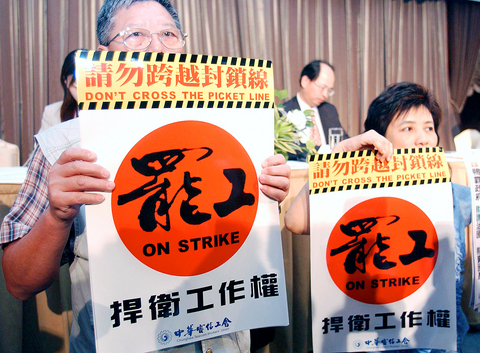In opposition to the government selling its shares in the state-controlled Chunghwa Telecom Co (
"We'll launch a long-term strike starting tomorrow [Tuesday] morning, which might last two or three days," Hung Hsiu-lung (洪秀龍), a core member of the Chunghwa Telecom Workers' Union (中華電信工會), said yesterday.
The union has been opposing the government's plan to privatize the telecommunications giant, worrying that their employee pension benefits will be sacrificed.

PHOTO: AFP
The Ministry of Transportation and Communications, the biggest shareholder in the company, plans to auction off a 3 percent stake to domestic investors today and another 14 percent stake through American Depositary Receipts (ADRs).
This will help reduce the ministry's stake in the company from the current 65 percent to around 48 percent, making Chunghwa Telecom a private entity.
The labor union said it was seeking an injunction from a US court against an additional 13.5 percent sale of the company's equity through ADRs.
"The contracted US attorneys-at-law is to file for an injunction by a US court tomorrow at the latest to freeze Chunghwa Telecom's ADR sale," which Chuang Ping-tang, secretary-general of the labor union, insisted is a violation of the law.
Although the labor union vowed to hold strikes on a larger scale than ever, company officials are unfazed and promised the public that services will continue as normal.
"We are confident that there will only be a small number of employees joining the strike or protesting in front of the company headquarters. Backup personnel will fill the vacant posts to offer services and protect consumers' rights," said company vice-president and spokesman Hank Wang (王漢朝).
Clashes between the union and management dominated and led to an abrupt halt of a meeting held yesterday in Taipei by the company to provide detailed information about the planned after-hours auction of its shares this afternoon.
Around ten union members held posters and signs voicing their opposition against the government's share sales in front of the podium while Wang was briefing scores of interested investors about the benefits of buying Chunghwa Telecom stocks.
"We oppose the heavy-handed manner with which the government wants to sell off national property cheaply, thereby enriching business conglomerates," read the posters, which were also distributed to members of the audience attending the meeting.
Despite the union's repeated efforts to stop the sales, Chunghwa Telecom chairman Hochen Tan (賀陳旦), president Lu Shyue-ching (呂學錦) and several high-level executives have already embarked on a road show in Hong Kong, Singapore, Japan and Europe to promote the company's ADR sales.
Meanwhile, Chunghwa Telecom vice-president Chang Feng-hsiung (
"I guarantee that Chunghwa Telecom will do whatever it can to prevent subscribers' rights from being compromised under any circumstances," he said.
Jonathan Liao (廖俊傑), an analyst with SinoPac Securities Corp (建華證券), said it is expected that the company can successfully be privatized this week, which will help pump nearly NT$100 billion (US$3.14 billion) into state coffers to help the government put a brake on its rising budget shortfall.
But because of the labor union's protest, the company's share price will lose momentum in the short term and do more harm than good, he said.
Chunghwa Telecom shares fell nearly three percent to close at NT$61.5 yesterday on the Taiwan Stock Exchange.

The New Taiwan dollar is on the verge of overtaking the yuan as Asia’s best carry-trade target given its lower risk of interest-rate and currency volatility. A strategy of borrowing the New Taiwan dollar to invest in higher-yielding alternatives has generated the second-highest return over the past month among Asian currencies behind the yuan, based on the Sharpe ratio that measures risk-adjusted relative returns. The New Taiwan dollar may soon replace its Chinese peer as the region’s favored carry trade tool, analysts say, citing Beijing’s efforts to support the yuan that can create wild swings in borrowing costs. In contrast,

Nvidia Corp’s demand for advanced packaging from Taiwan Semiconductor Manufacturing Co (TSMC, 台積電) remains strong though the kind of technology it needs is changing, Nvidia CEO Jensen Huang (黃仁勳) said yesterday, after he was asked whether the company was cutting orders. Nvidia’s most advanced artificial intelligence (AI) chip, Blackwell, consists of multiple chips glued together using a complex chip-on-wafer-on-substrate (CoWoS) advanced packaging technology offered by TSMC, Nvidia’s main contract chipmaker. “As we move into Blackwell, we will use largely CoWoS-L. Of course, we’re still manufacturing Hopper, and Hopper will use CowoS-S. We will also transition the CoWoS-S capacity to CoWos-L,” Huang said

VERTICAL INTEGRATION: The US fabless company’s acquisition of the data center manufacturer would not affect market competition, the Fair Trade Commission said The Fair Trade Commission has approved Advanced Micro Devices Inc’s (AMD) bid to fully acquire ZT International Group Inc for US$4.9 billion, saying it would not hamper market competition. As AMD is a fabless company that designs central processing units (CPUs) used in consumer electronics and servers, while ZT is a data center manufacturer, the vertical integration would not affect market competition, the commission said in a statement yesterday. ZT counts hyperscalers such as Microsoft Corp, Amazon.com Inc and Google among its major clients and plays a minor role in deciding the specifications of data centers, given the strong bargaining power of

TARIFF SURGE: The strong performance could be attributed to the growing artificial intelligence device market and mass orders ahead of potential US tariffs, analysts said The combined revenue of companies listed on the Taiwan Stock Exchange and the Taipei Exchange for the whole of last year totaled NT$44.66 trillion (US$1.35 trillion), up 12.8 percent year-on-year and hit a record high, data compiled by investment consulting firm CMoney showed on Saturday. The result came after listed firms reported a 23.92 percent annual increase in combined revenue for last month at NT$4.1 trillion, the second-highest for the month of December on record, and posted a 15.63 percent rise in combined revenue for the December quarter at NT$12.25 billion, the highest quarterly figure ever, the data showed. Analysts attributed the